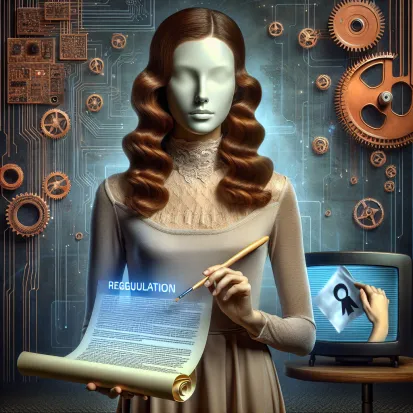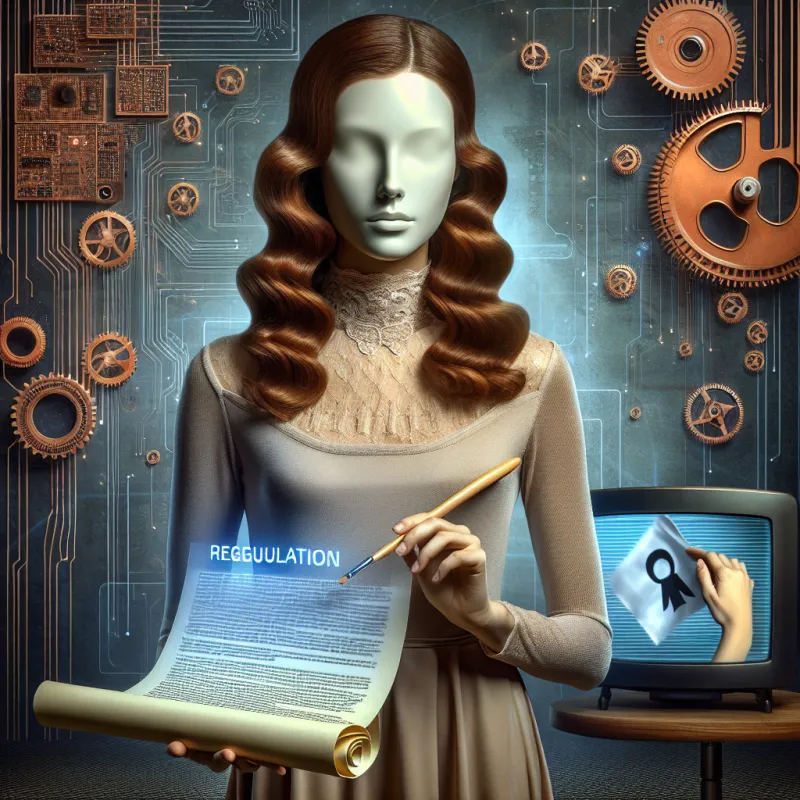AI, Antisemitism, and Celebrity Critique: Scarlett Johansson's Call for Regulation
The rapid advancement of artificial intelligence (AI) presents a myriad of opportunities, but also introduces complex ethical and legal challenges. A recent incident involving an AI-generated video featuring celebrities addressing antisemitism has brought these issues sharply into focus. This article explores the controversy, particularly highlighting Scarlett Johansson's strong condemnation of AI misuse and her renewed call for robust regulation to protect individual rights and prevent the amplification of hate speech. The incident underscores the critical need for governments, tech industries, and public figures to collaborate in addressing the challenges posed by this rapidly evolving technology.
Introduction
In a striking illustration of AI's potential for both good and misuse, a viral video recently surfaced, purportedly featuring prominent celebrities delivering a message condemning antisemitism. Among the figures seemingly participating was Scarlett Johansson, adding significant weight to the video's message. However, the video's origin and the nature of its creation quickly became a subject of intense scrutiny. This event triggered significant discussion about the ethics of AI and the use of celebrity likenesses without consent.
Scarlett Johansson, already a vocal advocate for AI regulation, responded with strong criticism, focusing on the unauthorized use of her image and the broader implications of unchecked AI development. Her involvement has reignited the debate on the necessity of clear legal frameworks to govern AI and safeguard individual rights in the digital age.
Background on AI-Generated Video
The AI-generated video in question aimed to address recent instances of antisemitism, purportedly showcasing a roster of Jewish celebrities expressing their condemnation of such prejudice. The video reportedly included voices and likenesses of individuals like Scarlett Johansson and Steven Spielberg, lending a high profile to the cause. The intent, at least superficially, appeared to be positive: to raise awareness and stand against hate speech.
The creation of the video was attributed to Guy Bar and Ori Bejerano, Israeli entrepreneurs involved in AI technology. While the creators' intentions may have been aligned with combating antisemitism, the use of celebrity likenesses without explicit consent raised immediate and serious ethical red flags. The technology used to create the video, while impressive, opened a Pandora's Box of questions about ownership, consent, and the potential for manipulation. The focus of the video, regardless of good intentions, was overshadowed by concerns about the ethical application of AI.
The video emerged in a context of heightened awareness surrounding antisemitism, fueled in part by controversial actions and statements by public figures. This pre-existing sensitivity amplified the impact of the AI-generated content, making the need for responsible AI usage even more pressing. The climate surrounding the video, combined with its unauthorized use of celebrity likenesses, created a volatile situation demanding immediate attention.
Scarlett Johansson's Stance and Criticism
Scarlett Johansson's response to the AI-generated video was unequivocal: she condemned the misuse of AI technology, particularly concerning the unauthorized appropriation of her likeness. Johansson has a long-standing history of advocating for AI regulation, a position solidified by previous experiences with deepfake technology and other instances of digital identity infringement.
Johansson's past experiences include instances where her image was used in online advertisements without her permission, highlighting the vulnerability of individuals, especially those in the public eye, to AI-driven manipulation. She has been proactive in pursuing legal action against those who have exploited her image and voice, emphasizing the importance of protecting one's digital identity. This past experience made her reaction to the current situation even stronger.
Johansson also maintains a strict zero-tolerance policy regarding antisemitism, and she voiced concerns about the potential for AI to amplify hate speech and further disseminate harmful ideologies. She recognizes the inherent risks associated with unregulated AI, particularly its capacity to create and spread misinformation, exacerbate existing prejudices, and damage reputations.
Beyond the ethical considerations, Johansson’s concerns also extended to the personal impact of AI on her life and career. The unauthorized reproduction of her likeness and voice has tangible consequences, requiring legal intervention and posing ongoing challenges to her professional endeavors. The constant vigilance required to monitor and combat AI-related misuse adds a significant burden. Her strong stance is therefore based on principle, but also deeply rooted in her personal experiences dealing with this technology.
Public and Legal Reactions
The non-consensual use of celebrity images in the AI-generated video sparked widespread ethical concerns and fueled intense public debate. Many questioned the appropriateness of using AI to create content featuring individuals without their explicit consent, regardless of the message being conveyed. The discussion extended beyond the specifics of this particular video to encompass the broader ethical implications of AI technology and the need for safeguards to protect individual rights.
Channel 4, a British television network, faced legal scrutiny for airing a related AI-generated segment that also involved Johansson's likeness. The incident raised questions about journalistic standards, the verification of AI-generated content, and the potential for media outlets to inadvertently contribute to the spread of misinformation or the violation of individual rights. The incident involving Channel 4 intensified scrutiny on media outlets and the challenges presented by AI-generated content.
Legal experts weighed in on the matter, highlighting potential violations of consent laws, such as the Sexual Offences Act 2003, which, while primarily focused on sexual offenses, provides a framework for understanding the importance of consent in the digital age. They emphasized the importance of adapting legal frameworks to address the unique challenges posed by AI, particularly in the context of digital identity and the unauthorized use of personal information. The discussions amongst legal experts show how existing legal structures may need to be revised to address the implications of AI-generated content.
Calls for Regulation and Global Comparisons
Scarlett Johansson's response to the AI video included a direct plea to the U.S. government for urgent AI regulation. She emphasized the need for legislation to protect individual rights, prevent the misuse of AI technology, and establish clear guidelines for its development and deployment. Johansson argued that the U.S. is lagging behind other countries in addressing AI-related issues, and that swift action is necessary to mitigate the potential risks.
Many countries have already taken significant steps to regulate AI, addressing issues such as data privacy, algorithmic bias, and the use of AI in law enforcement. The European Union, for example, is developing comprehensive AI regulations aimed at promoting responsible innovation and protecting citizens' rights. Johansson highlighted the need for the U.S. to learn from these international examples and develop its own robust regulatory framework.
The implications of AI misuse extend far beyond the entertainment industry. AI has the potential to impact various aspects of society, from healthcare and finance to education and criminal justice. Unregulated AI could exacerbate existing inequalities, discriminate against vulnerable groups, and undermine democratic processes. The broader implications of AI misuse make effective regulation a priority across all sectors.
Kanye West's Actions and Industry Repercussions
While not directly related to the AI video, the controversy surrounding Kanye West's actions and statements leading up to the AI controversy created the backdrop against which the video was viewed. West's controversial actions, including his embrace of antisemitic tropes and his website's promotion of merchandise featuring swastika-themed imagery, had already generated widespread condemnation and fueled a climate of heightened sensitivity.
The legal fallout from West's actions included severed ties with his talent agency and Shopify's removal of his ecommerce platform. These actions demonstrated the industry's intolerance for hate speech and the consequences that can arise from promoting discriminatory ideologies. The industry's response shows the business risks associated with promoting intolerance.
The industry and public responses to West's escalation of antisemitism highlighted the importance of accountability and the need for individuals and organizations to take a stand against hate speech. The episode served as a reminder of the real-world impact of words and actions, and the responsibility that public figures have to promote inclusivity and respect. It underscored the connections between hateful ideologies and the potential for AI to be used to further disseminate harmful content.
Legal and Ethical Debates Surrounding AI
The recent events have reignited crucial legal and ethical debates surrounding AI-generated content. The central questions revolve around the ethical responsibilities tied to the creation and dissemination of AI-generated materials, particularly when they involve the likenesses and voices of real individuals without their explicit consent.
The industry must establish clear standards and ethical guidelines for the development and use of AI technology. This includes addressing issues such as transparency, accountability, and fairness. Companies developing AI tools should be responsible for mitigating the potential risks associated with their technology and ensuring that it is used in an ethical and responsible manner. The ethical guidelines must also cover user rights, consent and data usage.
Stronger legal protections are needed to safeguard individual identities and ensure consent in digital spaces. This could include legislation that specifically addresses the unauthorized use of celebrity likenesses, the creation of deepfakes, and the dissemination of AI-generated misinformation. The legal framework should strike a balance between protecting individual rights and fostering innovation in the AI field. The goal is to encourage the development and use of AI in a way that is both beneficial and ethical.
Conclusion
The AI-generated video controversy underscores the potential risks and misuse associated with artificial intelligence. Scarlett Johansson's unwavering advocacy for AI regulation highlights the urgent need for comprehensive measures to protect individual rights, prevent the amplification of hate speech, and ensure the responsible development of this powerful technology.
The path forward requires collaborative efforts from governments, tech industries, and public figures. Governments must enact clear and enforceable regulations to govern the development and deployment of AI. Tech companies must prioritize ethical considerations and develop responsible AI tools. Public figures must use their influence to raise awareness about the risks of AI misuse and advocate for policies that protect individual rights. Only through a coordinated and collaborative approach can we harness the benefits of AI while mitigating its potential harms.


